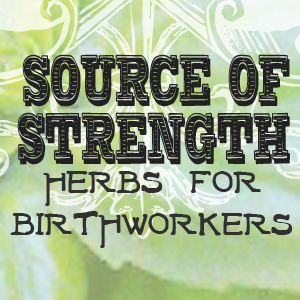Source of Strength : Herbs for Birthworkers
As an herbologist who has been involved in the birthworker world for many years and is partnered with a midwifery student, I work with a lot of birthworkers in my practice. The needs of on-call birthworkers require herbs that hold a certain quality of flexibility and adaptability that reflect the often unpredictable hours and demands of the birth world. We need herbs to lend us strength when negotiating overculture systems of health that don’t always respect our holistic models of care. Or herbs that remind us to take care of ourselves in the same ways we compassionately tend to our clients. Herbs are excellent allies for birthworkers and when used conscientiously and consistently they can be very effective remedies.
First, a very quick breakdown of general self-care:
- Eat Well
- Sleep Well
- Love What You Do
- Love Who You You Do It With
- And Love All that is You
Assess and redress any shortcomings on the list above – always strive for surplus love.
We’ll begin our series of Herbs for Birthworkers with a brilliant group of herbs that are known as adaptogens. Adaptogens are herbs that help us to adapt - especially to stressful situations. Birthworkers, at our best, could be called the adaptogens of the birth team.
Adaptogens are fantastic daily tonics as their healing qualities are best experienced over a long period of time helping the body to find balance and build up its reserves of strength and adaptability. For birthworkers, in particular, adaptogens help us to be present by supporting flexibility in all of our body systems, which is needed when you’ve had three hours of sleep in the past 24 hours and you’ve just been called to your next birth. And you can’t find your shoes. Or the car keys.
Let’s begin!
Part I : Adaptogens
YARROW Achillea millefolium
Yarrow is an exceptionally useful herb for healers. Known as the “Wounded Warrior, Wounded Healer,”[1] Yarrow is for those folks who are always on call – the ones who are the first in and the last out in any endeavor and who are prone to ignore health needs until they are lying flat on their backs. The lesson of Yarrow is to follow our own good advice and health recommendations for vital living, healing, and resting that we share with so many others in our practices as birthworkers and healers.
If you generally present as the most strong and able in the room, but often feel the most sensitive and bruised, Yarrow is your ally. If you push yourself to the limit when it comes to serving others, Yarrow is a great herb to incorporate into your daily life. In and out of hospital settings filled with all sorts of viruses, intense chemicals, harsh lighting, and other environmental pollutants, Yarrow is for you. Find yourself missing meals or eating at odd hours of the night and early morning? Yarrow is a bitter herb that aids digestion and should be considered.
Yarrow is an everyday tonic with the skills of a crisis manager. It helps those who feel they must always be the strongest to be able to express their vulnerabilities in ways that restore true fortitude.
How To Use Yarrow:
As a bitter-tasting herb, I usually recommend Yarrow as a tincture, either extracted in alcohol or glycerine, for daily use. Consider 1 – 10 drops up to three times daily. For situations of acute indigestion or fever, a hot tea of Yarrow hourly is best. Learn how to make a medicinal cup of tea here.
MACA Lepidium meyenii
Maca is a generous little tuber native to the Andean Mountains of Bolivia and Peru. Thriving in such a high altitude and harsh climate, Maca is a tremendously sturdy plant that has adaptogenic, restorative, and aphrodisiac qualities.
Another herb for folks who work long (and odd) hours, Maca is an adrenal tonic, helping folks step back from the verge of burnout so many birthworkers find themselves looking at the edge of. Maca restores our vital reserves, supporting our adrenals with alkaloids that have a beneficial affect on our hypothalamus-pituitary axis, and feeds our bodies with multiple vitamins and minerals including B vitamins, iron, zinc, fatty acids, and amino acids.
Attending long births or have you been overdoing it for too long? Get yourself some Maca. Feeling weak and overexposed? Maca may be your mate. Are you exhausted? Hi there, my name is Maca.
On an emotional level, Maca reconnects our heart to our core strength, helping us to continue on as powerful, present, and compassionate in all we do.
How To Use Maca:
Maca has a malty taste that many folks find to be quite pleasant which is why I generally recommend it in powdered form for daily use. Simply mix 1 teaspoon – 1 tablespoon of Maca into your smoothies, juices, cereals or syrups and enjoy. Maca can also be taken as an extract, 1 – 10 drops daily up to three times a day. Alternatively, Maca is easy to find at health food stores in capsules and might be the most convenient way for some folks. The benefits of Maca are best experienced over long-term usage, so consistent use is important.
TULSI Ocimum sanctum
Tulsi, also known as Sacred Basil, is a no-nonsense, up-in-your-aura, fire-breather of an herb. Tulsi is dragon medicine, old world basilisk herbology and one of its greatest gifts is the relentless pursuit of what-is-good-for-you. So if you have a habit that’s not serving you (like eating mindlessly, talking mean to yourself or refusing to acknowledge the wisdom of what you have to offer the world), Tulsi’s going to burn it up and rebirth you from the ashes.
In addition to being an adaptogen, Tulsi is a digestive aid, stoking our inner digestive fires. The herb moves heat through the body, which if you find yourself often in cold, sterile hospitals, or are generally someone who tends to be colder, Tulsi is helpful. Tulsi is also gently detoxifying, helping to remove harmful substances from the body. As an incredibly intelligent herb, Tulsi relaxes when we need to be soothed and enlivens when we need stimulation. Clever herb, that Tulsi.
Find yourself feeling cold and sluggish after a birth? Try Tulsi. Feeling stagnant and lacking direction? Tell Tulsi about it. If you are a bit odd, spiritually-inclined, and worried that you may be slightly broken, Tulsi is an ally and will help you find strengths in the cracks and crevices.
Tulsi helps us release that which no longer serves us and take up only that which feeds our deepest needs.
How To Use Tulsi:
My absolute favorite way to experience Tulsi is as a glycerite. Tulsi tea is delicious, whether from the fresh or dried herb, and the herb can be incorporated into juices, smoothies, and general food preparations (it is a Basil, so use it as you would Basil in cooking). If taking as an extract, whether glycerite or alcohol-based, 1 – 3 drops up to three times daily is a great daily tonic.
Next time we’ll be exploring Nervines!
♦ ☆ ♦ ☆ ♦ ☆ ♦ ☆ ♦ ☆ ♦ ☆ ♦ ☆ ♦ ☆ ♦ ☆ ♦ ☆ ♦ ☆ ♦ ☆ ♦ ☆ ♦
Interested in learning more about incorporating herbology into your daily life?
Check out my how-to section for more free tutorials and support the work of ecstatic herbology for the masses by purchasing a fine copy of my ebook, Morning Mischief: Fully Enchanted Herbal Recipes for Delicious Awakenings + Resolute Magnificence. Yup, it is chock-full of color, cleverness, unicorns, and it’ll inspire you to integrate herbal healing into your daily routine!
Contact me at wortsandcunning {at} gmail {dot} com for more information on private consulations, workshops, and teaching. Be sure to browse the shelves of my Apothecary at Poppy Swap or Etsy for remedies for you and your clients.





